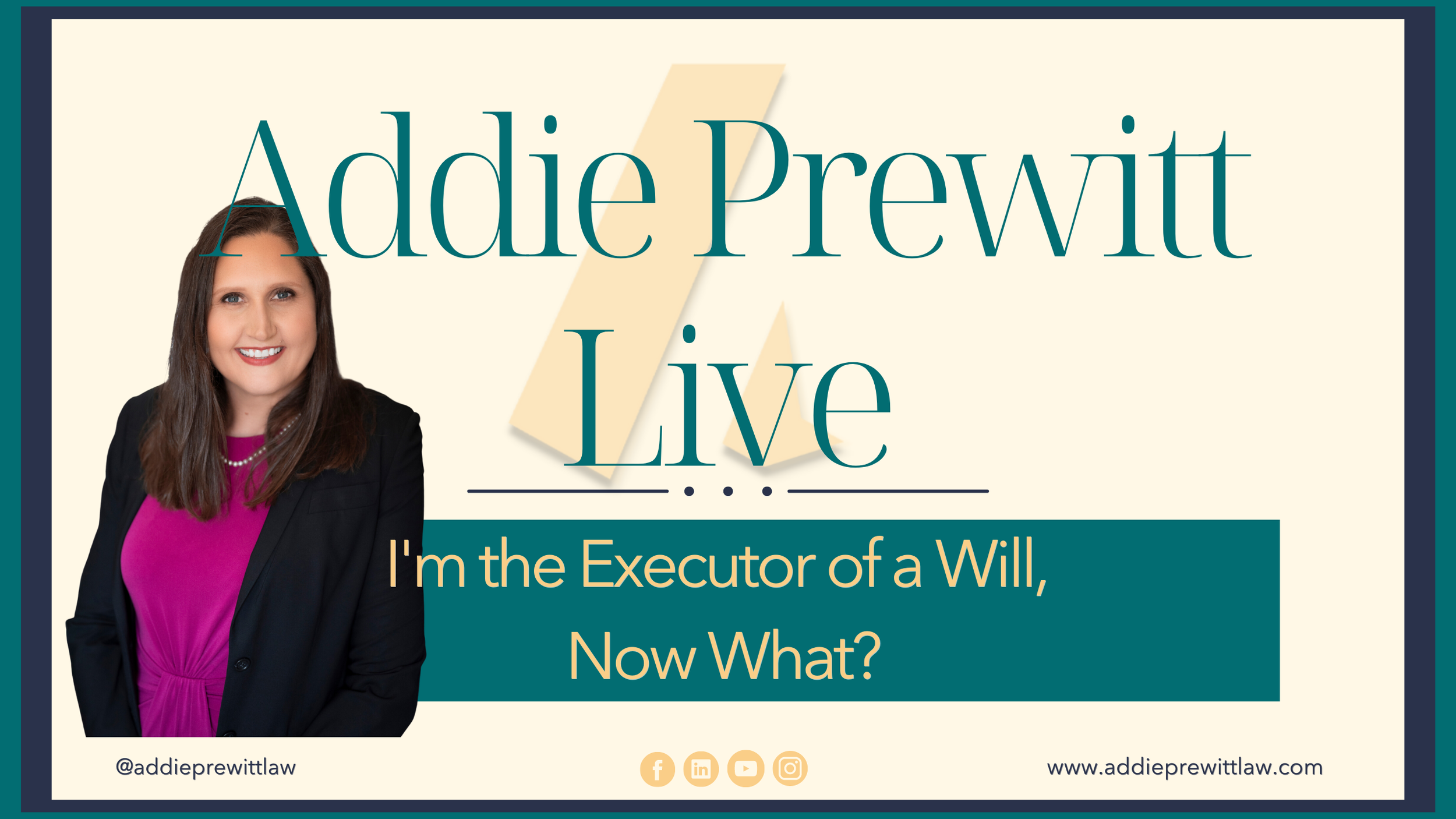You've Been Named Executor of a Will. Now What?
In this post, I’ll be focusing on the Louisiana estate planning process. Mainly, on how important (and misunderstood) the role of the executor is.
I was born in Lafayette, Louisiana. The heart of Cajun Country. When I was growing up, my grandparents lived next door to us. There was rarely a day without a visit to or from someone in the extended family. There was always lots of talking, cooking, and always something to celebrate. Growing up, the family indulgence was season tickets to Saints games in the fall.
Many of us in Louisiana are proud members of large, lively families who get together as often as we can - often filling whichever room(s) we’re in.
As an estate planning lawyer based in New Orleans, it’s important to educate my fellow Louisianans on the best way to properly prepare themselves by creating estate plans that take care of the people you value most.
When being named the executor of someone’s estate, it can feel overwhelming, especially if you’re a member of a large family. It’s important that you know what’s required before the time comes for you to take action. Many people either aren’t sure what the executor does, or have misconceptions about everything this role requires.
That’s why I’m here to help.
Let's talk about the executor's role
Simply put, the executor’s role is to:
Gather all of the deceased person's property (or documentation of where the property is located like deeds to real estate or financial accounts).
Find out where all the debts are.
If there are debts, they need to be paid.
Distribute the remaining property to the beneficiaries as directed in the will.
To some, this might sound simple, but obviously, it's a very time-consuming and emotionally fraught experience.
Usually, people who are named executors of an estate are doing it for a loved one.
So, it can be a tough situation. You're asked to fulfill all these legal requirements, and it can take quite a lot of time. The probate process is not a quick one, after all.
Check out the Addie Prewitt Live episode of “I’m the executor of a will, now what?” here. (You’ll be introduced to my sometimes cohost, Gabe.)
The first thing to do when you've been named as the executor of a will in Louisiana
As a will’s executor, the first thing to do is to find out whether you've been named as an independent executor.
Louisiana has independent administration proceedings, which just means going through the succession process without getting court approval for every action.
If your family gets along, then this succession process can be a friendly one.
For ‘friendly families’, I always recommend this route as it involves limited court oversight (so much lower attorneys fees) and allows the family to deal with things as they see fit.
With this process, the independent executor will only be reporting certain steps as they’re handled to the court, such as
preparing an inventory of all the deceased's property and debt.
filing a petition to distribute the property according to the terms of the will.
An option of succession with administration is also possible.
This requires much more court oversight and might be the best option for families with disputes or estates with outstanding debts or conflicts. But in this case, you would need to get court approval for routine matters such as paying the electricity bill for the decedent's house.
Questions to ask if you’re named a will’s executor before the person dies.
If you know before the person dies that you’ve been named executor of their will, the first thing you want to do is make sure you’re as clear as possible on what their estate plan actually is.
This is typically where people struggle. People often describe feeling awkward, timid, or afraid of sounding disrespectful when trying to bring up the conversation surrounding a loved one’s end-of-life care. This is oh-so-very understandable. But, if you know that responsibility will fall to you down the road, it’s extremely important to prepare yourself as much as possible.
As a possible executor, here are a few tips for starting the estate planning conversation:
Always remember that this communication is an act of love.
Start slowly, and ask a question or two when the time feels right.
Perhaps you can schedule a time to have this discussion, so no one feels caught off guard.
Offer to help organize necessary documents, so you can understand what’s involved.
Share your own experience and questions, and offer to do some research if there’s something you’re unsure about. (look - you’ve already come to the right place!)
The more often you discuss it, the more normal it will become!
So you’re ready to have the conversation about estate planning. Now what?
Everyone is different, but you can ask general questions like:
Where do you keep all your important documents and papers?
Can I have a copy of those documents?
Is there a spreadsheet or central location that I can have access to?
Do you have passwords and login information collected and ready to share?
Did you work with an estate planning attorney?
If so, what is their contact information?
When was the last time you updated your will?
Do you have all tax information included for your final tax return?
Have you purchased or sold any property in the last 6 months? Are you planning to?
Do you have retirement benefits, social security benefits, pension, or any other payments besides or instead of income?
How many people are included in your will? Do you have contact information for them?
Are all of your assets located in the same state or country?
Do you own stocks and/or bonds?
These questions (and answers) can look different for lots of people. Make sure to take notes and/or make copies of important information.
There’s no one right way to be properly prepared.
Some people will have a dedicated folder, organized and easy to find. Others will have everything in a drawer, a safe, or a box in the attic. My grandma has it all in one drawer and everybody knows that's where her important papers are.
This is why it’s so important to have these discussions with your loved ones as soon as possible. Most people were never taught how to discuss end-of-life care or what they’d want to happen to their estate upon their death. It’s important that these talks get normalized and that as the executor, you have all the information you need today.
And, if they don’t have one place where everything goes (drawer or spreadsheet), you might want to gently encourage them to put it in one place.
Bottom line: the more prepared in advance, the easier it is later.
Feel in over your head? I’m here to make sure you’re as prepared as possible.
You’ll be able to talk to me directly (not a paralegal) for a full hour. You can ask questions specific to your situation, and I’ll give you customized and compassionate legal advice, every time.
Finally, the most common responsibilities that executors are surprised by
You have to file the deceased’s person’s final income tax return.
Many elderly individuals may not have taxable income at the time of their death. But if someone has a taxable income of over $600, a final tax return will need to be filed.
One of the best things you can do is to get access to the person's last tax return which gives you a great place to start.
If you use your own accountant or bookkeeper or tax preparer, they can probably help you with this.
Gather as much information from the person as possible, if you know that you’ll be the executor prior to their death.
The executor should open a bank account in the name of the estate.
To do this, most banks will make you get an EIN (employer identification number). Typically, this is just the social security number for the estate.
The name of the estate is the name of the deceased person.
There's an online portal on the IRS site that has resources and information on how to get the EIN.
You’ll need to contact the IRS to change the estate address in order to receive correspondence about the estate from the IRS.
Here’s where you can find information about updating the estate address with IRS.
This can be challenging the first time you do it, which is why it’s important to know about it in advance.
It is definitely something you can ask your lawyer, CPA, or bookkeeper to help you with, especially to make sure the information is correct.
Feel in over your head? Reach out to me today.
Estate Planning Takes Time.
As the executor, your action can help determine how long it takes for an estate to settle. Typically, the more prepared you are yields the quickest possible outcome.
It’s important to know how you take care of these steps because they can determine how long it takes to settle the estate.
So, remember, the executor of the estate will have to file an income tax return. But, just because a return is filed doesn't mean there's going to be any income tax due.
An example of taxable income would be if the deceased person held a rental property, and was getting money each month from the rental property.
That would be income that the estate would have to report on its own tax return (filed by the executor).
Make sure you understand what's going on now, prepare the best you can, and it will typically pay dividends in the future.
Are you a Louisiana professional interested in passing your legacy onto future generations with a thorough estate plan?
Are you the executor of someone’s will?
Were you prepared? What do you wish you knew? What surprised you? What resources did you find helpful?
I’d love to hear from you about your experience!
Want to know more about working with an estate planning lawyer?
Check out my blog post taking you through the process of estate planning with a lawyer from start to finish.
Take Care,
Addie Prewitt
FAQ
Q: Which documents will I likely need to create a well-prepared estate plan?
A: It can vary from client to client, but generally, folks looking to make an estate plan can count on needing some, if not all, of the following documents:
Last will and testament
Living trust
Beneficiary designations
Advance healthcare directive/healthcare power of attorney
Financial power of attorney
Insurance policies (health, life, car, home, etc.)
Proof of identity (social security card, prenup agreement, birth/marriage/divorce certificates, etc)
Titles and property deeds (car, home, boat, rental property)
Digital logins and passwords (yes, all of them)
Funerary instructions
Q: What is an executor?
A: An executor is a person who is responsible for gathering all of your property after you die and distributing it to the people named in your will.
Q: Do I really need a will?
A: Yes.
Seriously, yes.
Pretty much everyone over the age of 18 needs a will.
You definitely need a will if you: own a house, have kids, or own a business.
Q: What happens if I die without a will?
A: If you don’t have a will, Louisiana law will determine where your property goes after you die.
This is called dying intestate.
The default rules may be what you want, but they also may not be what you want.
If you don’t know what those default rules are or you don’t want the state deciding where your property goes, then you need a will.





